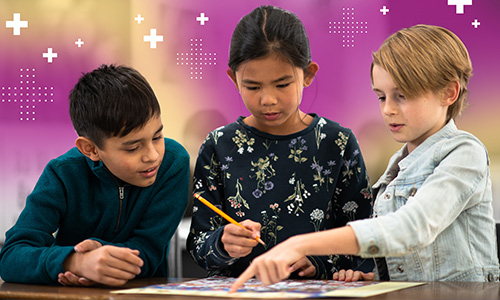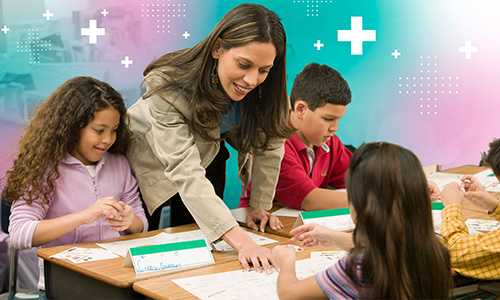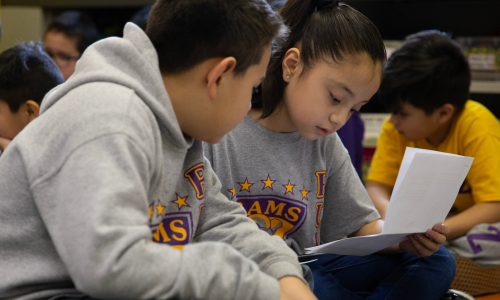
In a digital world, data is everywhere. Every time you interact with a platform, whether it’s a website, app, or game, you are generating data on your use of that platform. Data scientists work with that data to generate insights and predictions about your behavior, which might be used to display an advertisement or a recommendation. Everyday examples of such predictions include an advertisement on Facebook, Instagram, or TikTok; a TV show recommendation from Netflix; or a timely hint that helps you get past a difficult level of a game.
The field of data science, which utilizes data to build algorithmic predictions, is projected to be among the fastest-growing professions in the US over the next decade. Data scientists are well paid, with a median income of $100,910 per year in 2021.
In an effort to support today’s students in preparing for jobs in this field, we are hosting a data science competition in connection with the Data Science for Everyone coalition, which equitably advances K–12 data science education to equip students with the data literacy skills necessary for full participation in the modern world. NWEA seeks to encourage a diverse group of students to become interested and involved in data science, which is aligned directly with our mission: Partnering to help all kids learn®. This is critical because, as detailed in a recent Harnham report, the field is predominantly male-dominated (74% of data science professionals are male) and about 69% of the of data science workforce is either white or Asian, with only 4% of professionals identifying as Black and 6% as Hispanic.
Increasing the potential pool of data scientists
Addressing the lack of Hispanic and Black individuals and females in data science requires increased exposure to data science with adequate support and context. Providing opportunities to explore data science within schools is a promising way to address issues of representation; however, obstacles in increasing opportunities for exposure within schools remain.
Schools often lack the resources to support these opportunities for students, including technology to accommodate students in multiple classrooms, knowledgeable staff who can teach the programming skills inherent to data science and the general principles of data science, and adequate time for this as a course of study. As a result, instruction centered on data science, if it is provided at all, is likely to be relegated to electives accessible to some, but not all, students. This issue is further complicated by the fact that it can be extremely challenging to generate student interest in something they know little about.
A competition for high school students
The NWEA Data Science for Everyone (DS4E) Competition provides participating teams of high school students with data from the Programme for International Student Assessment (PISA) study, which is a study of 15-year-old students’ knowledge of mathematics, reading, and science. For this competition, we utilize a subset of the full data on students’ mathematics assessment scores, along with a host of demographic and psychological variables. Participating students will be tasked with predicting mathematics assessment scores by building machine-learning models based on the demographic and psychological variables in the dataset.
We will utilize the browser-based Kaggle data science platform to host the NWEA DS4E Competition. We chose to run this as a competition, rather than to present it as an activity, to maintain student interest and motivation and to encourage interaction with data and research scientists at NWEA. We view this as an opportunity for NWEA to give back to the community of high school students and as a way for us to contribute to our mission. The best part? The winners of the competition, judged by the accuracy of their prediction model, will be awarded a scholarship that they can use for their future college or professional studies!
How it works
The DS4E Competition is designed to provide opportunities for students to engage with data in a way that requires minimal prior knowledge or experience. The PISA data set has a limited number of variables (sometimes referred to as “features”) used to predict test takers’ mathematics test scores, making it accessible to beginners. Further, the competition is hosted on the free-to-use web-based Kaggle platform, so students only need internet access to participate.
Kaggle provides multiple resources to support those who enter data science competitions. The DS4E research team has also created a user guide for the competition and a data codebook that explains each variable in the dataset. A discussion board feature allows students to post questions and engage with others.
Additionally, the DS4E research team intends to provide opportunities for students to engage directly with researchers at NWEA. Students will be able to email members of the team with questions throughout the competition. Throughout the duration of the competition, a series of webinars or virtual talks will be offered, where students can interact with researchers in real time. Approximately every two weeks, students will have the opportunity to engage, ask questions about the dataset, and receive feedback on their approaches to working with data. On opposing weeks, students will have opportunities to meet other data scientists in the organization to learn more about what a data scientist does and ask questions about the field more generally.
The accessibility of the platform and the resources provided will allow students to participate in the competition with minimal to no adult support, meaning a teacher or other adult is not required to assist participating students with the competition, and the webinars and talks will be open to any participating student. Our hope is that because of how accessible the competition is, a broader range of students will be able to participate, regardless of school resources, providing us with the opportunity to provide broad exposure to data science, most significantly to underrepresented populations in the field.
Timeline and contact
The competition will begin in late February and will extend through mid-May. To participate, students will need to provide a signed parental consent form if they are under the age of 18. Additionally, parents or guardians of minors will need to sign up for their own free Kaggle account per Kaggle’s terms and conditions, though there is no expectation that adults will participate in any part of the competition using their Kaggle account.
The mission of the Data Science for Everyone coalition, which focuses on equitable access to data science education to open doors to higher education and high-paying careers in the field for all K–12 students, aligns meaningfully with our mission. This competition is a wonderful opportunity to help provide an accessible opportunity for all students with little to no past exposure to data science, and in a way that requires minimal-to-no support from educators.
If you know of students who might like to participate in this competition, or if you know of teachers who might like to use this opportunity to supplement curriculum by supporting students’ participation, encourage them to contact us at DS4E@nwea.org.
Your support in helping us spread the word about the competition will help us have a broad impact for as many students as possible and contribute to the goal of shaping the demographics in the field of data science in the future.
Melissa Fowler, project manager at NWEA, contributed to this post.







